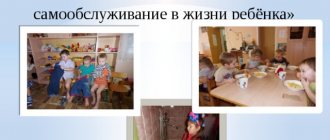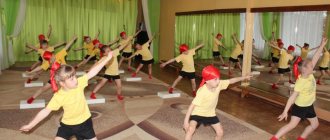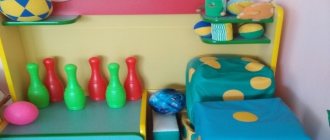Organization of the daily routine of preschoolers
Preschooler's daily routine
The daily routine is of great importance for the health and physical development of children. Constant time for eating, sleeping, walking, playing and studying is what I.P. Pavlov called it an external stereotype - a prerequisite for the proper upbringing of a child.
Daily regime
- this is a clear daily routine of life, providing for the alternation of wakefulness and sleep, as well as the rational organization of various types of activities. A correct regimen that corresponds to the child’s age-related capabilities improves health, ensures efficiency, successful implementation of various activities, and protects against overwork.
The physiological basis that determines the nature and duration of activity is the level of performance of the cells of the cerebral cortex, therefore it is so important not to exceed the performance limit of the central nervous system, as well as to ensure its full functional recovery after work. The degree of morphofunctional maturity of the organism determines the content of the daily routine and the duration of its main elements, among which the following are distinguished:
- dream;
– staying outdoors (walking);
– educational and training activities;
– gaming activities and activities of one’s own choice (reading, music, drawing and other creative activities, sports);
– self-care, family assistance;
– meals;
- personal hygiene.
When carrying out regime processes, the following rules must be adhered to:
1. Complete and timely satisfaction of all organic needs of children (sleep, nutrition).
2. Careful hygienic care, ensuring cleanliness of the body, clothes, bed.
3. Involving children in participating in regime processes as much as possible; encouraging independence and activity.
4. Formation of cultural and hygienic skills.
5. Emotional communication during routine processes.
6. Taking into account the needs of children, the individual characteristics of each child.
7. Calm and friendly tone of address, careful attitude towards the child, elimination of long expectations, since the appetite and sleep of children directly depend on the state of their nervous system.
Basic principles of building a daily routine:
1. The daily routine is carried out throughout the entire period of raising children in a preschool institution, maintaining consistency, constancy and gradualness.
2. Correspondence of the correctness of the daily routine to the age-related psychophysiological characteristics of the preschooler. Therefore, in the National Children's Educational Institution, each age group has its own daily routine.
3. The organization of the daily routine is carried out taking into account the warm and cold periods of the year
WHAT IS THE DAY SCHEDULE IN KINDERGARTEN?
The importance of a child's daily routine
A correct regimen that corresponds to the child’s age-related capabilities improves health, ensures efficiency, successful implementation of various activities, and protects against overwork. In a child accustomed to a strict routine, the need for food, sleep, and rest occurs at certain intervals and is accompanied by rhythmic changes in the activity of all internal organs. The body, as it were, adjusts in advance to the upcoming activity, so it is carried out quite efficiently, without unnecessary waste of nervous energy and does not cause pronounced fatigue. Good performance during the day is ensured by a variety of activities and their alternation. From a physiological point of view, this is explained by the ability of the cerebral cortex to simultaneously work and rest. At each individual moment, not its entire surface is working, but individual areas, namely those that are in charge of this activity (the field of optimal excitability). The remaining areas of the cortex are at rest at this time. All physiological processes in the body, having their own biological rhythm, obey a single daily rhythm - the change of day and night. During the day, the child’s activity and performance are not the same. Their rise is noted from 8 to 12 hours and from 16 to 18 hours, and the period of minimum performance occurs at 14-16 hours. It is no coincidence, therefore, that activities that cause pronounced fatigue in children are planned in the first half of the day, during hours of optimal performance. The duration of periods of wakefulness in preschoolers is limited to 5-6 hours. This implies the need to alternate wakefulness and sleep.
HYGIENIC ASPECTS OF ORGANIZING THE DAY REGIME FOR PRESCHOOL CHILDREN
The concept of “daily routine” includes the duration, organization and distribution during the day of all types of activities, rest and meals. A rationally constructed and organized regime is an important factor in ensuring timely and harmonious physical and mental development of children and adolescents, an optimal level of performance, and also prevents the development of fatigue and increases the overall resistance of the body.
In connection with the beginning of early education and its intensification, deviations are noted in the daily routine of preschoolers, forming functional and other health disorders.
The main hygienic principle of constructing a rational daily routine is its strict implementation, the inadmissibility of frequent changes, and the gradual transition to a new regime of education and training.
According to modern concepts of the theory of functional systems of the body, the development of a dynamic stereotype, as well as its change, occurs gradually, over a certain period of time, under repeated conditions [7]. It is noted that the smaller the child, the more difficult it is to form a dynamic stereotype, and a small child is more sensitive to any changes in it.
The physiological basis that determines the nature and duration of activity is the level of performance of the cells of the cerebral cortex, therefore it is so important not to exceed the performance limit of the central nervous system, as well as to ensure its full functional recovery after work. The degree of morphofunctional maturity of the organism determines the content of the daily routine and the duration of its main elements
Dream
ensures complete functional restoration of all body systems. The physiological need for sleep in children of different ages depends on the characteristics of their nervous system and state of health (Table 1). In the preschool period, both night and daytime sleep are required, regardless of whether the child attends a preschool educational institution (DOU), a short-stay group or not. A full night's sleep is important for both preschoolers and schoolchildren, since it is known that it is during this period that information is transferred from short-term (operative) memory to long-term memory, which is a necessary condition for educational activities and mental development. Depending on age, bedtime is recommended to range from 20:30 to 22:30 hours.
Table 1. Duration of sleep in children
Staying in the open air
(walking) is the most effective type of rest, due to increased blood oxygenation, replenishment of ultraviolet deficiency, allowing for hardening of the body and an increase in physical activity. Walks are especially important for preschool children: in winter, at least 4-4.5 hours, and in summer, if possible, all day. The walk is not carried out at an air temperature below -15 °C and a wind speed of more than 15 m/s for children under 4 years old, and for children 5-7 years old at an air temperature below -20 °C with a wind speed of more than 15 m/s (for average stripes).
Educational activities.
When building a rational training regimen, one should take into account the biorhythms of the functioning of the child’s body. In most healthy children, the greatest excitability of the cerebral cortex and performance are determined in the morning - from 8:00 to 12:00 hours and in the evening - from 16:00 to 18:00 hours.
Training and education programs at preschool educational institutions provide for developmental activities. In the younger group, the duration of classes is 10-15 minutes (10 lessons per week), in the middle group (4-5 years old) - 20 minutes (10 lessons per week), in the older group (5-6 years old) - two lessons per week. day for 20-25 minutes with a break of 10 minutes. In the preparatory group (6-7 years old) - 3 lessons a day are held for 25-30 minutes, taking on the nature of training. The duration and frequency of classes during the day and week for children who do not attend preschool educational institutions should correspond to the recommended ones, as for children of organized groups. Hygienic studies have shown that classes on speech development, literacy, mathematics, and familiarization with the outside world are more tiring than modeling, drawing, and design. Physical education and music (dynamic exercises) reduce or relieve fatigue.
Currently, there is a large selection of additional educational services for preschoolers. Hygienists recommend conducting additional education classes for children of the 4th year of life no more than once a week, lasting no more than 15 minutes; for children 5-6 years of age - no more than 2 times a week and no more than 25 minutes; for children 7 years of age - no more than 3 times a week, lasting no more than 30 minutes. It is unacceptable to conduct these activities at the expense of walking and sleeping time.
Gaming activities and recreation of your own choice
contribute to the formation of positive emotions in children, individual inclinations and the development of creative abilities. It is imperative to give the child time for free activities of his own choice (reading literature, playing music, drawing, sports, social work).
Play activities for preschoolers are allotted time in the morning before breakfast, during walks in the first and second halves of the day, after naps and in the evening before bed. Games should be varied, individual and group, role-playing, didactic, and active. Thus, didactic games are similar to educational activities, are characterized by low mobility, and provide an emotional coloring of wakefulness. Outdoor games, especially outdoors, help strengthen the body, increase its endurance, and improve movements. Every day, children can spend their free time in accordance with their interests and do what they love. Such a vacation brings pleasure, evokes positive emotions, and relieves psychological stress. It must be remembered that watching TV and working on the computer create conditions for a significant load on the visual analyzer.
Time for self-care, helping family
should also stand out in the daily routine. Preschool children can perform simple self-care duties, helping to clean dishes and rooms (no more than 15 minutes a day). Both at home and at school, students can and should provide all possible assistance in cleaning the premises, putting away dishes, watering plants, caring for younger children, etc. Learning self-service and engaging in socially useful work must begin from the first years of school. It is strictly forbidden to involve children in work that poses a risk to life, is unsafe from an epidemiological point of view (cleaning toilets) and exceeds the physical capabilities of the child’s body. The duration of such work for preschoolers should be no more than 30 minutes.
Meals and personal hygiene
are mandatory components of the regimen for children of any age. The concept of diet includes strict adherence to the timing of meals and the intervals between them, a physiologically rational frequency of meals, the correct distribution of the quantity and quality of food among meals. If the intervals between meals are not observed, normal gastric secretion is disrupted and appetite decreases. Preschoolers without health problems should eat 4-5 times a day with an interval of 3.5-4 hours
Compliance with a rational daily routine by children and adolescents helps to strengthen and improve their health, as well as increase the effectiveness of educational and educational activities.
Recommendations for parents “Organization of the daily routine in the conditions of family education”
In modern conditions, many parents believe that they can give their child much more knowledge at home. In this regard, they take on great responsibility. When raising a child at home, you need to understand that the child is deprived of full communication with peers at various regime moments. Communication only on the street is not enough. The child must learn to interact with other children in classes and matinees. Nowadays, kindergartens pay great attention to the diversified development of the child. Here are a few simple rules for organizing a daily routine in a family environment:
1. Follow the daily routine and diet adopted in kindergarten at home.
2. At home, praise the child for showing independence, performing proper hygiene procedures, fostering the habit of cleanliness (washing, washing feet before bed in the summer, monitoring the condition of hands, washing hands after a walk, using toilet paper, brushing teeth, rinsing mouth after food).
3. Maintain a walking routine. Give your child the opportunity to move freely during walks. Start a family tradition of playing sports.
4. Provide an emotional, joyful background to the child’s life. Maintain a joyful atmosphere in the family. Keep the traditions of family holidays. Visit theaters with your child. Concerts. Circus.
5. To eliminate and prevent violations in sound pronunciation, conduct play exercises with your child. Special game exercises are also used to develop phonemic hearing and speech attention.
6. Let children at home, under the supervision of an adult, cut with scissors, sew with a needle, sculpt, and so on.
7. Tell and show your children a lot, read fiction.
Compliance with these rules by parents will make life easier for their children. After all, the situation may change and the child will need to go to kindergarten. In this case, he will already have basic self-service skills.
Daily routine in kindergarten for younger and older children
The daily routine in kindergarten differs for younger and older children. Teachers of younger groups pay more attention to the development of cultural and hygienic skills than directly to educational activities. The classes themselves are shorter here, lasting 10-15 minutes. The teacher conducts the lesson in subgroups. Children's walks are shorter in duration because a lot of time is spent on the process of dressing and undressing. Because of this, there are no walks for small children in the evening.
As children age, not only the difficulty of the activity increases, but also its duration. Therefore, there is less time for daytime sleep, and walking, on the contrary, increases.
Organizing a daily routine in a preschool educational institution is important for children. Parents should know how their child’s day is planned in kindergarten, and try to adhere to this schedule at home.
Daily routine in kindergarten







